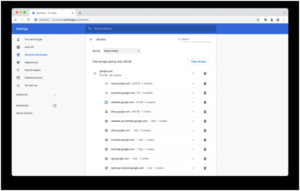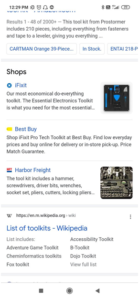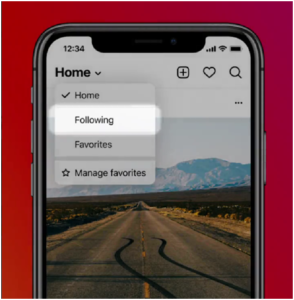SEO
Free SEO Analysis
SEO Services
Content Marketing Services
Local SEO
Link Building Services
Specialized SEO Services
PPC
REPUTATION MANAGEMENT
Free Reputation Management Analysis
Reputation Management Services
Review Management Services
Specialized Reputation Management Services
CEO Reputation Management
Brand Enhancement
Business and Directory Listings
Comprehensive Reputation Management Audit
SOCIAL MEDIA
Free Social Media Analysis
Specialized Social Services
WEB DEVELOPMENT
Free Website Analysis
Web Design Services
Mobile Development Services
Website Maintenance Services
Specialized Development Services
MARKETING AUTOMATION
Free Marketing Automation Analysis
Specialized Marketing Automation Services
Comprehensive Marketing Automation
INDUSTRIES
ABOUT DMA
Digital Marketing
Digital Marketing News 01/06/2022 – 01/10/2022
Request a quote
Its Fast, Easy & Free
Executive Summary
New version of Google Chrome lets you delete the data a website has on you
Class-action lawsuit alleges Google paying Apple to stay out of the search engine business
Microsoft’s New IndexNow plugin can help WordPress Websites Index Content Faster
Cross-channel Data-Driven Attribution (DDA) is now available in Attribution Reports
This week on latest digital marketing updates: New version of Google Chrome gets a privacy update to let users delete data a website has on them, Google launches Shops section in mobile search shopping-related queries, class-action lawsuit against Google and Apple challenges the United States Antitrust Laws, Instagram to roll out three new types of content feeds so users can personalize their Instagram feed, Microsoft Bing’s new IndexNow plugin speeds up process of search engines crawling WordPress websites, and cross-channel data-driven attribution model now added within the advertising workspace.
Here are the latest news, trends, and updates in detail:
New version of Google Chrome lets you delete the data a website has on you
Google released Chrome 97, the latest iteration of its internet browser. And it comes with a privacy upgrade, giving more control over the data that websites store on individual visitors.

This release comes just under two months after Chrome 96 in November 2021. Chrome only lets you delete individual website cookies until this point. This major privacy update in Chrome 97 gives you the ability to erase all the data and information a website stored on your visit.
Update has been released as of January 4, 2022. You can test the new feature by navigating to Settings > Security and Privacy > Site Settings > View Permissions and Data Stored Across Sites.
This new update will affect how advertisers can serve ads to privacy-focused individuals as Google and other search engines use cookies to make ads more relevant to the user.
Google launches “Shops” in mobile search results
Google users can now see between three to ten merchants on select mobile device shopping-related queries.
The Shops section in Google is now available in mobile search results for shopping-related searches in the US. This feature now enables retailers to become visible organically to mobile users.

Shops is based on organic search ranking, so merchants who don’t rank well may not be able to reap its benefits. In addition, because non-shopping results may also appear in the same search engine results page, it may push non-shopping related results down the page and may potentially affect clickthrough.
Google has been expanding its shopping-related results to offer plenty of visibility opportunities for non-paying merchants. Starting in April 2020 when Google introduced free product listings on Google’s Shopping tab in the US, and even the launch of the “Deals related to your search” section in July of 2021.
Organic eCommerce features such as this speaks to the rise of digital commerce.
Class-action lawsuit alleges Google paying Apple to stay out of the search engine business
Google, one of the world’s most popular search engine is facing a lawsuit claiming a direct violation of the U.S. Antitrust Laws.
Antitrust law is a collection of federal laws developed to ensure fair competition exists in an open-market economy to protect consumers by promoting competition and preventing monopolies.
A class-action lawsuit issued by California Crane School, Inc. on December 27, 2021 claims that Google and Apple agreed that the latter would not compete in the internet search business against Google.
The complaint claims that the means to operate the non-compete agreement included Google paying multi-billion dollars to Apple not to compete in the search business, Google sharing search profits with Apple, Apple giving preferential treatment to Google for all Apple devices, suppression of competition of smaller competitors, and acquiring actual and potential competitors.
An injunction prohibiting the non-compete agreement between Google and Apple is being requested by the California Crane School, Inc. In addition, calls for Google and Apple to breakup into separate and independent companies respectively with the precedent of Standard Oil into Exxon, Mobile, Conoco, Chevron, and others.
Customization Updates to Roll Out in the Instagram Feed
New types of content feeds are being tested to give users the option to customize what they see in their Instagram feed.
Head of Instagram Adam Mosseri shared a Twitter post on Instagram feed changes that users can expect in the next couple of months.
Particularly, the three feeds include:
Home –
Current Instagram experience today where content is ranked based on an
, largely based on how likely you’ll be interested in specific posts
Favorites –
This feed will contain content from accounts that you want to make sure you don’t miss out from, such as family or favorite content creators.
Following –
A chronological list of posts just from the people you follow.

These changes are in the effort to help people feel good about the time they spend on the app and create a more positive experience by giving the option to customize their Instagram feed.
When it comes to content discovery, it now brings potential for accounts to become more visible and build an audience. All, while making sure that those who want to stay within their circle aren’t served with posts from accounts that they don’t follow.
Mosseri says that they are in the testing phase in the next couple weeks and are hoping to launch the full experience by the first half of the year.
Microsoft’s New IndexNow plugin can help WordPress Websites Index Content Faster
The latest Bing initiative improves crawling on WordPress websites with the IndexNow plugin automatically generating API key to notify search engines of website changes.
IndexNow plugin is an open-source software offering that automatically generates and hosts the API key that search engines need to index on a WordPress website. Once this API is used, search engines are notified of updates and can crawl and reflect websites changes in their index and search results. This submits the URLs in the background for search engines to track and index.
Search engines can provide the best value to searchers if they always have the latest version of updated sites. When website owners provide a clear signal, it helps search engines prioritize the crawl for these URLs.
Ensuring timely information is available for searchers is crucial according to a Microsoft Bing blog post. “..historically one of the biggest pain points for website owners has been to have search engines quickly discover and consider their latest website changes. It can take days or even weeks for new URLs to be discovered and indexed in search engines, resulting in loss of potential traffic, customers, and even sales.”
Many large websites, including eBay, LinkedIn, and GitHub plan to migrate to IndexNow, according to Microsoft. And if you publish content on these sites, your content will automatically reap is benefits.
This plugin is now available in the WordPress’ plugin directory.
Cross-channel Data-Driven Attribution (DDA) is now available in Attribution Reports
DDA And all rules-based attribution models have been added to the property-level Reporting Attribution Model within the Advertising Workspace.
Attribution is the act of assigning credit for conversions to different ads, clicks, and factors along a user's path to completing a conversion. The rule, set of rules, or data-driven algorithm that determines how credit conversion is assigned to touchpoints on conversion paths is the Attribution Model.
Now, the cross-channel DDA is now available in the Conversion paths and Model Comparison of Attribution reports according to a January 7, 2022 announcement of Google. It will apply to the Total Conversions, Total Revenue, and Purchase Revenue metrics in any report where you can use event-scoped traffic dimensions such as Default channel grouping, Campaign, Source, and Medium.
Since conversion can happen days or weeks after a person interacts with your ad, you can adjust the lookback window. The lookback window determines how far back in time a touchpoint is eligible for attribution credit. For example, a 30-day lookback window will result in a January 30th conversions being attributed to touchpoints between January 1 to 30.
To update your attribution settings, go to the Property Column of choice > Attribution Settings > Reporting attribution model and selecting the desired model from the drop-down. Under Lookback Window, select the lookback windows for Acquisition Conversion Events and All Other Conversion events.
What you can do next
If your site is a WordPress site, consider exploring IndexNow plugin to enjoy faster indexing of your every website update
Optimize your organic search efforts such as
and backlinks to maximize the new Shops section in mobile view of shopping-related search queries
Revisit your Instagram content plan and aim for quality posts to prepare for upcoming changes in the feed
Our Sales team